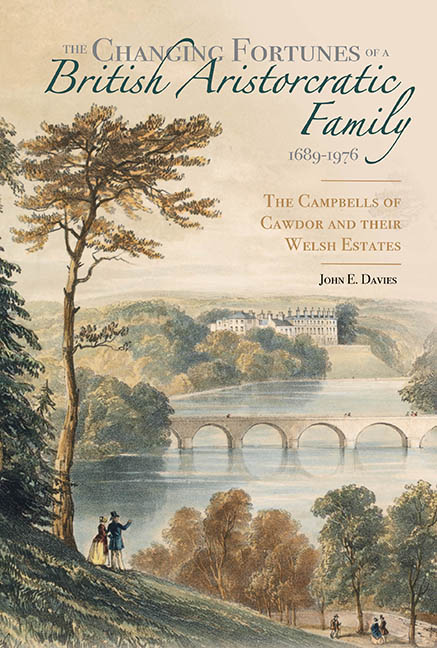 The Changing Fortunes of a British Aristocratic Family, 1689–1976
The Changing Fortunes of a British Aristocratic Family, 1689–1976 Book contents
- Frontmatter
- Contents
- List of Illustrations
- Acknowledgements
- List of Abbreviations
- Pedigree
- Introduction
- 1 Cawdor and Campbell
- 2 Estate Administration
- 3 The Agricultural Estate: The Cawdors as Farmers and Landlords
- 4 The Cawdors as Industrial Landowners
- 5 The Cawdors in the Community: Church and Education
- 6 The Mêlée of Local Governance
- 7 The Cawdors in Politics: Interest Building, Consolidation and Decline
- 8 Private and Exclusive Lives
- 9 The End of the Welsh Estates
- Conclusion
- Bibliography
- Index
5 - The Cawdors in the Community: Church and Education
Published online by Cambridge University Press: 21 March 2020
- Frontmatter
- Contents
- List of Illustrations
- Acknowledgements
- List of Abbreviations
- Pedigree
- Introduction
- 1 Cawdor and Campbell
- 2 Estate Administration
- 3 The Agricultural Estate: The Cawdors as Farmers and Landlords
- 4 The Cawdors as Industrial Landowners
- 5 The Cawdors in the Community: Church and Education
- 6 The Mêlée of Local Governance
- 7 The Cawdors in Politics: Interest Building, Consolidation and Decline
- 8 Private and Exclusive Lives
- 9 The End of the Welsh Estates
- Conclusion
- Bibliography
- Index
Summary
In the latter half of the eighteenth century in Wales, the Anglican church, financially bereft, and decaying both physically and morally, was a long time in stirring from its moribund state, and recovering to a point where it could hold its own with the nonconformist denominations. It was only towards the end of the nineteenth century that the Carmarthen Journal, albeit a pro-church newspaper, was able to say of the Anglican church in Wales that it ‘is doing admirable work at the present time, and – she has not been so popular for at least a hundred years’. For most of that century the nonconformists of Wales were not only in a majority but became increasingly distanced from, and critical of, the Anglican church. And in this process of alienation they became radicalised by a prolonged anti-church campaign waged in the Welsh-language denominational and popular press. The Anglican church was rightly seen by the leaders of nonconformity as providing spiritual justification and succour for the landed elite. Welsh nonconformists, who, by the mid-nineteenth century, had a far more powerful voice within their communities than did their counterparts in the various shires in England, opposed the established church over a variety of issues. English-speaking bishops, church rates, education, tithes, all rankled, and out of these vexations there emerged a growing call for the disestablishment and disendowment of the Anglican church in Wales, a call which became increasingly vociferous after the Irish church was disestablished in 1869. (It is necessary, however, to recognise that so far as the diocese of St David's was concerned, within which the Cawdor estates lay, ‘the provision of Welsh-language services was substantial’ and belied some of the ‘outspoken comments made about the Englishness of the Church in the heated campaign for Disestablishment’.) In the years before 1885 the call for disestablishment in Wales was framed very much along the lines of English Liberationism – that church and state in all countries should be separated on principle. However, from the mid-1880s the argument for disestablishment changed its nature by becoming closely associated with the surging spirit of Welsh nationality. Indeed, the campaign for disestablishment was the main goal of Welsh nationalism.
- Type
- Chapter
- Information
- The Changing Fortunes of a British Aristocratic Family, 1689–1976The Campbells of Cawdor and their Welsh Estates, pp. 137 - 170Publisher: Boydell & BrewerPrint publication year: 2020


